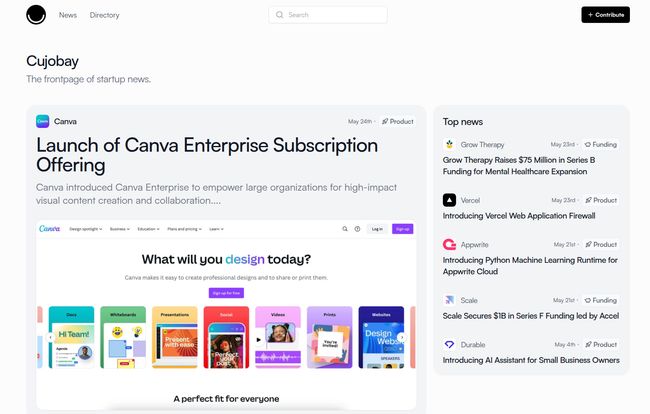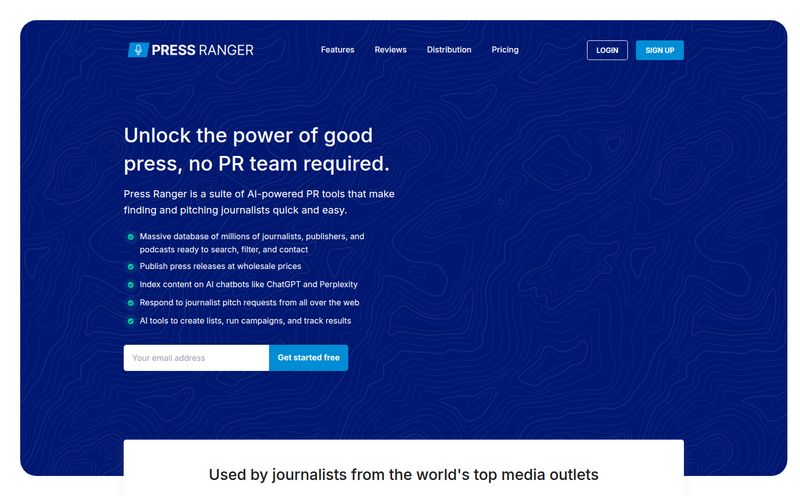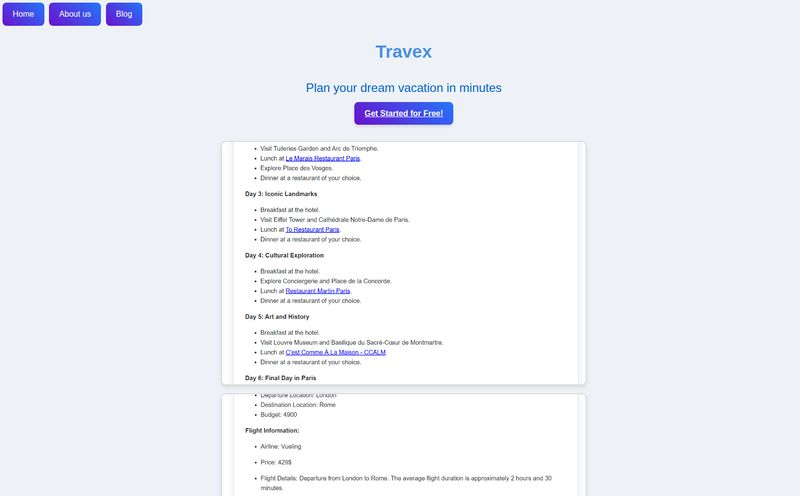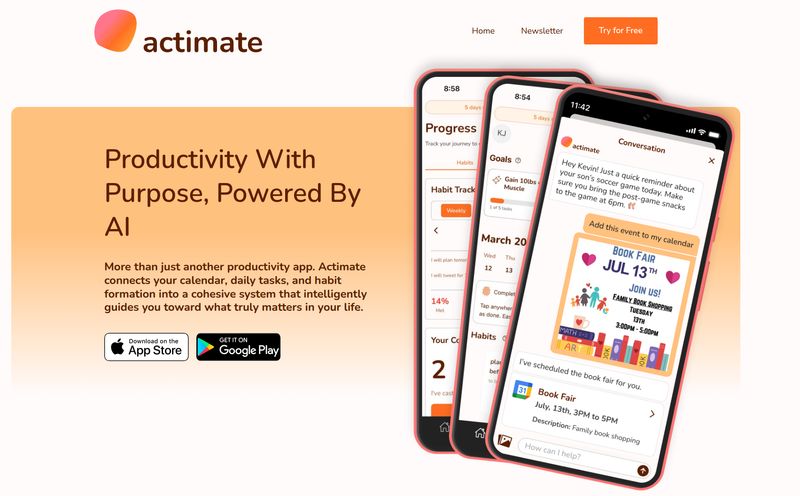If I see one more breathless post on X or LinkedIn about a "revolutionary" new AI wrapper that summarizes articles, I might just log off for good. The startup world, which I love, has become an absolute firehose of information. It’s a constant barrage of funding announcements, product launches, pivots, and flameouts. Keeping up isn’t just a full-time job; it’s an extreme sport.
I’ve got my feeds dialed in—TechCrunch, a dozen newsletters I never open, Product Hunt, the usual suspects. But most days, it feels like I'm just panning for gold in a river of mud. It's noisy. It's chaotic. And honestly? It's exhausting.
So, when I stumbled upon a new platform called Cujobay, my first reaction was a healthy dose of skepticism. Another one? Really? But its tagline, "The frontpage of startup news," gave me pause. It wasn't promising to be the biggest or the most comprehensive. It was promising to be the front page. That implies curation, importance, and a certain signal-to-noise ratio that I’ve been craving. I decided to click around, and what I found was… well, let's talk about it.
So, What Exactly Is Cujobay?
At its core, Cujobay is two things: a startup news aggregator and a directory of startups. But that description is a bit dry, like calling a vintage sports car just "a mode of transportation." The magic is in the execution.
Unlike the sprawling databases of something like Crunchbase, where you can get lost for hours in funding rounds and employee counts, Cujobay feels more like the morning paper. It gives you the big headlines—a major launch from a company like Canva, a big Series B for a health-tech firm, a cool new feature from an infrastructure player like Vercel. It’s all there, clean and concise.
The other half of the equation is its directory, which is organized by what it calls "spaces." This is a small but brilliant detail. Instead of rigid, old-school industry verticals like "Software" or "Healthcare," it uses more fluid, descriptive tags that reflect how the tech world actually thinks and works. Think "AI Assistants" or "Mental Healthcare Expansion." It’s a semantic approach that just makes more sense.

Visit Cujobay
The Good Stuff I'm Seeing
After spending a few days with Cujobay as my morning coffee companion, a few things really stood out to me. It's not perfect, but there's a certain elegance to its simplicity.
Finally, a Tool that Cuts Through the Clutter
This is the big one for me. The main feed isn't an endless scroll of every press release that hits the wire. It's curated. It feels like someone is actually making editorial decisions about what’s important for you to see today. It’s less of a deafening firehose and more of a curated tasting menu of the startup ecosystem. This makes it incredibly useful for getting a quick pulse check without committing your entire morning to the task.
The "Spaces" Concept Is Genuinely Smart
I mentioned this before, but it's worth repeating. Organizing by "spaces" is a game-changer. Why? Because modern startups are rarely just one thing. Is a company using AI to help with therapy a "Health" company, a "SaaS" company, or an "AI" company? Yes. The concept of spaces allows for this fluidity. It helps you discover adjacent companies and trends in a way that rigid categories just can't. It's a small UX choice that reveals a deep understanding of the industry's interconnected nature.
That Semantic Search Is a Hidden Gem
The platform boasts a semantic search capability, and in my tests, it works surprisingly well. I didn't just search for "Canva." I tried searching for concepts like "tools for small business owners" or "AI for developers." The results felt relevant and discovery-oriented. This is far more powerful than a simple keyword match and turns the directory from a static list into a proper research tool for finding solutions, not just company names.
Where It Could Be Even Better
No tool is perfect, especially a newer one. Cujobay has a few areas where its strengths also create some limitations. It's important to know what you're signing up for.
The Double-Edged Sword of Curation
While I love the curated feel, it also means the news feed isn't exhaustive. If you're a VC analyst who needs to know about every single seed round in the fintech space globally, this isn't going to replace your specialized data sources. Cujobay is for the overview, the highlights, the big picture. It’s for discovery, not deep-dive forensics. And for most of us, that's a pretty good tradeoff.
It’s a Community Garden, Not a Supermarket
The image shows Cujobay has around 934 startups and 374 spaces. That's a great start, but it's not the millions of entries you'll find elsewhere. The directory's completeness is clearly reliant on user contributions—you can see the big "+ Contribute" button in the corner. This makes it feel like a growing, community-driven project. It's exciting, but also means there might be gaps. It’s a community garden that's getting more fruitful every day, but it's not a fully-stocked supermarket just yet.
Cujobay vs. The Giants Like Product Hunt and Crunchbase
So, where does this fit in my workflow? Does it replace anything? I don't think so. I see it as a fantastic complementary tool. Here's my mental model:
- Crunchbase is my encyclopedia. It's for deep, historical data. Who invested in whom, when, for how much. It's the system of record.
- Product Hunt is my launch-day party. It's for what's new and shiny right this second. It's about the product itself and the community's immediate reaction.
- Cujobay is my morning briefing. It's the curated summary of significant moves—funding, major product tiers, acquisitions. It connects the dots between the data in Crunchbase and the launches on Product Hunt. It provides the narrative.
It fills a gap I didn't even fully realize I had. It's the connective tissue.
What's the Damage? A Look at Pricing
This is often the part of the review where I have to weigh the features against a monthly subscription cost. But with Cujobay, it's simple. As far as I can tell from the site and the information available, it's free. There's no pricing page, no "request a demo" gate, no premium tier mentioned. In a world of ever-increasing SaaS subscriptions, that is a definately refreshing change of pace.
So, Who Is Cujobay Really For?
I've been thinking about this, and I can see a few personas getting a ton of value out of making Cujobay a daily habit:
- Venture Capitalists and Angel Investors: A quick, scannable way to spot trends and see which spaces are getting hot.
- Founders and Entrepreneurs: Great for keeping an eye on the competition, spotting potential partners, and getting inspiration.
- Product Managers & Marketers: An easy way to stay on top of market movements and see how competitors are launching and positioning new features.
- Journalists and Bloggers (hi!): An absolute gem for finding story ideas and getting a quick pulse on the day's biggest startup news.
- The Curious Enthusiast: If you just love technology and startups, this is a much more focused and less overwhelming way to stay in the loop than doom-scrolling on social media.
Frequently Asked Questions About Cujobay
- Is Cujobay free to use?
- Yes, based on all available information, Cujobay is completely free to use. There is no pricing information on their website.
- How is Cujobay different from a site like TechCrunch?
- Cujobay is primarily a news aggregator and a directory; it curates and links to news from various sources. TechCrunch produces original journalism, with in-depth articles, interviews, and analysis written by its own staff.
- How often is the content updated?
- The homepage states that new startups and spaces are featured every day, and the news feed appears to be updated in near real-time as announcements happen.
- Can I submit my own startup to the directory?
- Yes, there is a prominent "Contribute" button, which suggests that the platform relies on community and user submissions to grow its directory.
- What does organizing by "spaces" actually mean?
- It's a more modern and flexible way to categorize startups. Instead of a rigid category like "Finance," a startup might be in the "Alternative Lending" or "Personal Budgeting AI" space, which is much more descriptive.
My Final Take on Cujobay
I came in skeptical, and I'm walking away pleasantly surprised. Cujobay isn't trying to boil the ocean. It's not trying to be the most comprehensive database on the planet. Instead, it’s building something more focused, more curated, and frankly, more useful for a daily check-in. It's a tool that respects my time and attention.
It's a refreshingly minimalist take in a maximalist tech world. It successfully delivers on its promise to be "the frontpage of startup news." It has its limitations, sure, but it knows what it is and what it isn't. For anyone feeling the fatigue of information overload in the startup world, Cujobay might just be the clean, quiet, and insightful corner of the internet you've been looking for. It's earned a spot in my bookmarks bar.



